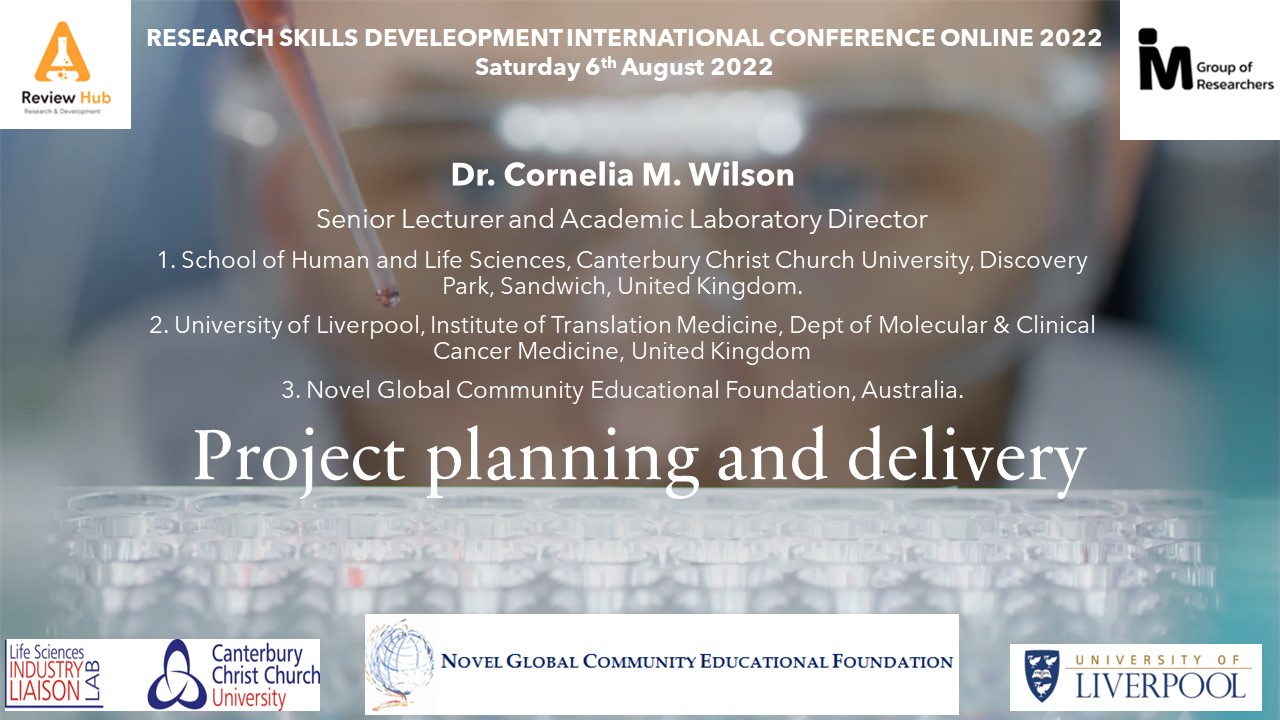Author: Dr. Cornelia M. Wilson
This article is an extended write-up of the Lecture presented by Dr. Cornelia M. Wilson at our “RESEARCH SKILLS DEVELEOPMENT INTERNATIONAL CONFERENCE ONLINE 2022 – Saturday 6th August 2022“
About Author:
Dr. Cornelia M. Wilson
Senior Lecturer and Academic Laboratory Director
1. School of Human and Life Sciences, Canterbury Christ Church University, Discovery Park, Sandwich, United Kingdom.
2. University of Liverpool, Institute of Translation Medicine, Dept of Molecular & Clinical Cancer Medicine, United Kingdom
3. Novel Global Community Educational Foundation, Australia.
Download the original PowerPoint presentation by clicking below:
Contents
▶The scientific process
▶Planning the research project
▶Where to start on the project proposal?
▶The proposal (research questions/aims, methodology, resources, data analysis, expected outcomes)
▶Research planning versus Research Methodology
▶Data: The Relationship to Design and Methodology – What is Data?
▶Timelines
▶Examples of research proposals
▶What is CDIO?
▶Summary
The Scientific Process

Planning the research project
▶Successful research is a well planned research
▶Not achieving your aim/goals due to partial thought-out plan and inconclusive design
▶Research requires a conceptualisation of overall organisation and detailed plan
▶Therefore, the plan should be precisely detailed.
▶A general strategy = research design (RD)
▶RD provides
▶Overall structure for the procedures
▶The data the researcher collects
▶The data analyses the researcher conducts
▶Must plan the overall design carefully to be successful
▶Wasted effort if half-prepared (vague ideas)
▶Must identify RESOURCES, PROCEDURES, and DATA always with the goal from the very beginning
Where to start on the project proposal?
▶Reading is essential
▶This will help you understand more of the field of topic
▶Search the literature for papers (use PUBMED, Google Scholar etc.)
▶Use keywords on your topic
▶Extend these key words
▶Talk to lab members and your colleagues etc.
The proposal

▶Topic
The topic of your research
▶Research Questions
List no more than four research questions including the null hypotheses
▶Importance
Explain why the research is important
▶Literature
Identify at least three broad areas of primary research literature which you intend to consult. For each area (a) explain how it relates to your research questions, and (b) provide no more than two key references.
▶Metholodogy
Describe (a) the research approach which you intend to employ, (b) how this will be translated into data collection or source consulation, and (c) how it is an appropriate means for addressing the research questions.
▶Data analysis
Describe what type of statistical analysis you will use to analyse your data (tests, software etc..)
▶Risk assessments
Do you have these in place?
Research planning versus Research Methodology
▶Who are willing to participate?
▶Do we have the equipment?
▶If so, do we have the technical skills to use it?
▶Are we able to interpret the findings?
▶Do we know how to draw conclusion?
▶It must be a practical research – something that we must be able to handle.
Data: The Relationship to Design and Methodology
▶Without the facts (data), inductive reasoning vanishes and scientific method collapses
▶The lifeblood of research
▶Data is a Latin verb dare, meaning “to give” – give information, impression or other factual data to an observer
▶Facts from Latin word facere, meaning “to make” – what the situation makes or manifests to the observer.
What is Data?
▶Data is the manifestation of the truth rather than the truth itself – no one has ever looked upon truth itself – pure, undisguised, naked Truth
▶Data are merely representative, intermediate, elusive surrogate of Truth – reflects Truth as a mirror which reflects sunlight
▶Researchers are like those who live in a dungeon seeing a beam of sunlight passes across the floor and get the idea of what the sun must be like
What are Data?
▶Factual dungeon – never be able to see the original source of the data
▶Research seeks, through data, what is true absolutely – the complete meaning of the data
▶Experienced researchers are constantly aware that the ultimate goal of research (Truth) is forever just beyond what is represented by the data, and hence, just beyond human grasp
Timeline
▶Consider (conservatively) how long each stage in the project will take.
▶Be realistic of your goals
▶Create a Gantt Chart

What is CDIO?

▶Concieved for engineers by Massachusetts Institute of Technology in the late 1990s.
▶In 2000, MIT in collaboration with three Swedish universities — Chalmers University of Technology, Linköping University and the Royal Institute of Technology — formally founded the CDIO Initiative
▶The CDIO revised syllabus consists of four parts:
▶Disciplinary knowledge and reasoning
▶Personal and professional skills and attributes
▶Interpersonal skills: teamwork and communication
▶Conceiving, designing, implementing, and operating systems in the enterprise, societal, and environmental context
Summary

Also read: Organic Farming: A Solution for Reducing Pesticide Residues in Food
Follow Us on

